 W
WThe 1920 Revolution Brigades is a Sunni militia group in Iraq, which includes former members of the disbanded Iraqi army. The group has used improvised explosive devices, and armed attacks against U.S. occupation forces. The group comprises the military wing of the Islamic Resistance Movement. The group is named in reference to the Iraqi revolt of 1920.
 W
WAl-Awda is a secular organization in Iraq. Al-Awda's name began appearing in Iraq in June 2003 in anti-occupation graffiti and leaflets in Baghdad and to the north and west of the capital. The group is led by Mohammed Younis al-Ahmed, who is based in Syria.
 W
WAl-Qaeda in Iraq or Al-Qaeda in Mesopotamia, officially known as Tanzim Qaidat al-Jihad fi Bilad al-Rafidayn or TQJBR, was an Iraqi Sunni Islamic Jihadist organization affiliated with al-Qaeda, for part of the first two decades of the 21st century.
 W
WAnsar al-Islam or Ansar al-Islam fi Kurdistan, also referred to as AAI, is a Sunni Muslim insurgent group in Iraq and Syria. It was established in northern Iraq by former al-Qaeda members in 2001 as a Salafist Islamist movement that imposed a strict application of Sharia in villages it controlled around Biyara to the northeast of Halabja, near the Iranian border. Its ideology follows a literal interpretation of the Quran and promotes a return to what it claims is the example of the first Muslims (Salaf). Following the 2003 invasion of Iraq, the group became an insurgent group which fought against the Kurdish government, American led forces and their Iraqi allies. The group continued to fight the Iraqi government following the withdrawal of U.S. troops from Iraq, and sent members to Syria to fight the government following the outbreak of the Syrian Civil War.
 W
WThe Arab Socialist Ba'ath Party – Iraq Region, officially the Iraqi Regional Branch, is an Iraqi Ba'athist political party founded in 1951 by Fuad al-Rikabi. It was the Iraqi regional branch of the original Ba'ath Party before changing its allegiance to the Iraqi-dominated Ba'ath movement following the 1966 split within the original party. The party was officially banned following the American invasion of Iraq in 2003, but despite this it still continues to function underground.
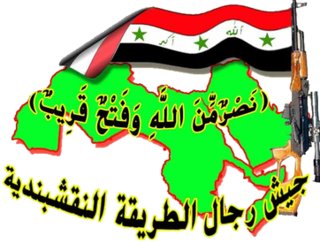 W
WThe Army of the Men of the Naqshbandi Order, also called the Naqshbandi Army, is one of a number of underground Ba'athist and Sufi militant insurgency groups in Iraq. Media frequently refers to the group by the initials JRTN, a romanization of its Arabic name. Supreme Command for Jihad and Liberation, technically the name of the umbrella organisation to which JRTN belongs, is also often used to refer to JRTN specifically.
 W
WAsa'ib Ahl al-Haq, also known as the Khazali Network, is an Iraqi Shi'a political party and paramilitary group active in the Iraqi insurgency and Syrian Civil War. During the Iraq War it was known as Iraq's largest "Special Group", and is now part of the Popular Mobilization Forces (PMF), a group of Shi’ite militias that are close to Iran.
 W
WThe Badr Organization, previously known as the Badr Brigades or Badr Corps, is an Iraqi Shia Islamist political party and military organization headed by Hadi Al-Amiri. The Badr Brigade was the Iran-officered military wing of the Iran-based Shia Islamic party, Supreme Council for Islamic Revolution in Iraq (SCIRI), formed in 1982. Since the 2003 invasion of Iraq most of Badr's fighters have entered the new Iraqi army and police force. Politically, Badr Brigade and SCIRI were considered to be one party since 2003, but have now unofficially separated with the Badr Organization now an official Iraqi political party. Badr Brigade forces, and their Iranian commanders, have come to prominence in 2014 fighting the Islamic State of Iraq and the Levant (ISIL) in Iraq. It is a part of the Popular Mobilization Forces.
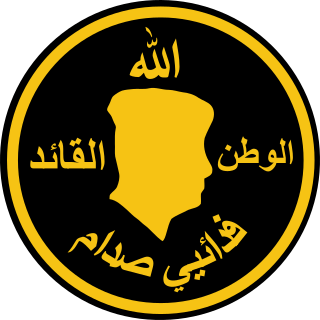 W
WFedayeen Saddam was a paramilitary organization loyal to the Ba'athist Iraqi government of Saddam Hussein. The name was chosen to mean "Saddam's Men of Sacrifice". At its height, the group had 30,000–40,000 members.
 W
WThe Hezbollah Movement in Iraq is a Shi'a Islamist, Iraqi political party that is part of the United Iraqi Alliance coalition. It is not affiliated with the Lebanese group Hezbollah or other groups using the name. Hezbollah, or more literally Hizb Allah, meaning "Party of God" in Arabic.
 W
WThe Islamic Army in Iraq (IAI) is one of a number of underground Islamist militant organizations formed in Iraq following the 2003 invasion of Iraq by United States and coalition military forces, and the subsequent collapse of the Baathist government headed by Saddam Hussein.
 W
WThe Islamic Front for the Iraqi Resistance abbreviated JAMI, is an insurgent group in Iraq, fighting the U.S. led coalition as a part of the Iraqi Insurgency. The group announced itself in around May, 2004.
 W
WJama'at al-Tawhid wal-Jihad, which may be abbreviated as JTJ or Jama'at, was a militant Jihadist group. It was founded in Jordan in 1999 and was led by Jordanian national Abu Musab al-Zarqawi for the entirety of its existence. During the Iraqi insurgency (2003–11), the group became a decentralized network with foreign fighters and a considerable Iraqi membership.
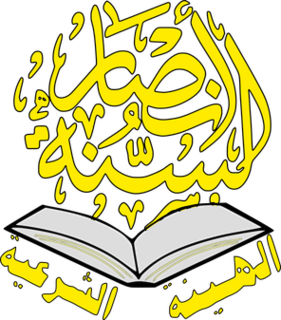 W
WJamaat Ansar al-Sunnah, also known as Jaish Ansar al-Sunna, was an Iraqi Sunni insurgent group that fought against US Troops and their local allies during the Iraq War. The group was primarily based in northern and central Iraq, and included mostly Iraqi fighters. In 2007, it split into two groups; one began operating under the name Ansar al-Islam, and the second group called itself Ansar al-Sunnah Shariah Committee, before changing its name to Ansar al-Ahlu Sunnah in 2011.
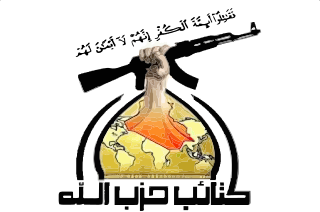 W
WKata'ib Hezbollah —or the Hezbollah Brigades—is an Iraqi Shia paramilitary group which is part of the Popular Mobilization Forces that are supported by Iran. During the Iraq War (2003–2011), the group fought against coalition occupation forces. It has been active in the War in Iraq (2013–2017) and the Syrian civil war (2011–present). The group was commanded by Abu Mahdi al-Muhandis until he was killed by a US airstrike in Baghdad on 3 January 2020. Thereafter, he was replaced by Abdul Aziz al-Muhammadawi, as the new leader of the Popular Mobilization Unit (PMU).
 W
WThe Jaish al-Mujahideen is a Sunni militant group in Iraq. The group first emerged in late 2004. The Mujahideen Army is one of the founding members of the Jihad and Reform Front as well as a member of the Political Council for the Iraqi Resistance (PCIR).
 W
WThe Mujahideen Shura Council (MSC), was an umbrella organization of at least six Sunni Islamic insurgent groups taking part in the Iraqi insurgency against U.S. and coalition and Iraqi forces: Tanzim Qaidat al-Jihad fi Bilad al-Rafidayn, Jaish al-Ta'ifa al-Mansurah, Katbiyan Ansar Al-Tawhid wal Sunnah, Saraya al-Jihad Group, al-Ghuraba Brigades, and al-Ahwal Brigades.
 W
WThe Peace Companies (Arabic: سرايا السلام, or Sarayat al Salam are an Iraqi armed group linked to Iraq's Shia community. They are a 2014 revival of the Mahdi Army that was created by the Iraqi Shia cleric Muqtada al-Sadr in June 2003 and disbanded in 2008.
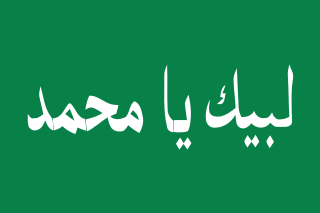 W
WThe Promised Day Brigade, originally called the Muqawimun was a Shi'a organization and was an insurgent group operating in Iraq during the war. In 2010, it was one of the largest and most powerful of what the US military call "Special Groups" in Iraq. The group was created as successor to Muqtada al-Sadr's Mahdi Army, which was Iraq's largest Shi'a militia until its disbanding in 2008, he also called on other Special Groups to join the brigade. Sadr had earlier already talked about the creation of a smaller guerrilla unit which would continue the Mahdi Army's armed activities but for the first time gave the organisation a name in November 2008 when he declared the creation of the Promised Day Brigade. Its activities have particularly increased since May 2009. The group's name is in reference to an alternate term for the Islamic Day of Judgment. The group is alleged to receive Iranian support. A crackdown against the group, in the end 2009, led to the arrest of 18 of its members including several commanders. On November 29, 2009, the group's Basra leader was arrested in al-Amarah.
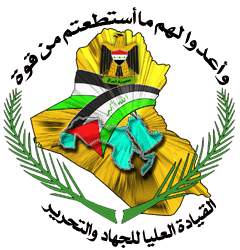 W
WThe Supreme Command for Jihad and Liberation is an Iraqi front comprising some 23 militia groups formed in October 2007 and led by former Iraqi vice president and deputy chairman of the Revolutionary Command Council Izzat Ibrahim al-Douri. The name is also often used to refer to the largest militia in the front, the Army of the Men of the Naqshbandi Order, which is commanded by Douri himself.